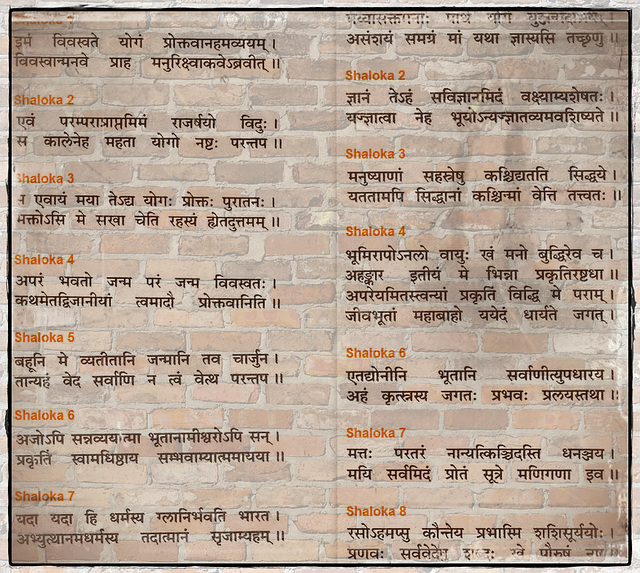Voltaire
Philosophy Day ~ 11/21/2013
Fig.79
Books
Books
Burning the Baker
Martian Time-Slip, by Philip K. Dick (1964)
Behind the Flying Saucers
The Flying Saucers Are Real
Escape the Night
The Smuggled Atom Bomb
The Fate of America Is Ticking Away
Honey Bunch: Her First Halloween Costume Party
Woman and Man at the High Water Mark Monument, Get…
Little Red Riding Hood Booklet
Men from the Moon in America: Did They Come in a R…
We Met the Space People
Happy New Year, John F. Clarke, New York, N.Y.
Let's Have Lamb: New and Distinctive Recipes
Campfire Marshmallow and Creme Recipes
Stoddard's Juvenile Mental Arithmetic
Book Club night
See also...
Keywords
Authorizations, license
-
Visible by: Everyone -
All rights reserved
- Photo replaced on 09 Jun 2013
-
139 visits
Samskrata ~ Sanskrit ~ संस्कृतम्


Sanskrit, also spelled संस्कृतम् (saṃskṛtam), is an ancient language of India commonly seen as the grandmother of the Indo-European language family (even English!). Closely allied with Prakrit and Pali, Sanskrit is more exhaustive in both grammar and terms and has the most extensive collection of literature in the world, greatly surpassing its sister-languages Greek and Latin.
- Keyboard shortcuts:
Jump to top
RSS feed- Latest comments - Subscribe to the comment feeds of this photo
- ipernity © 2007-2024
- Help & Contact
|
Club news
|
About ipernity
|
History |
ipernity Club & Prices |
Guide of good conduct
Donate | Group guidelines | Privacy policy | Terms of use | Statutes | In memoria -
Facebook
Twitter

“The Sanskrit language, whatever be its antiquity, is of a wonderful structure; more perfect than Greek, more copious than the Latin, and more exquisitely refined than either, yet bearing to both of them a stronger affinity, both in the roots of verbs, and in the forms of grammar, than could possibly been produced by accident: so strong, indeed, that no philologer could examine them all three, without believing them have sprung from some common source, which, perhaps, no longer exists”
The resemblances between European languages and Sanskrit, the oldest-attested language of the Indian subcontinent, had been noted as early as the 16th century, but the explanation advocated was that Sanskrit was the parent of the European languages. During the 19th century, the procedures of ‘comparative philology’ validated the common-source hypothesis beyond question. Minutely detailed investigation of all the major European languages, and several of their dialects, were carried out by such scholars as Franz Bopp, Jakob Grimm, and August Schleicher, and their work established Germany as the centre of comparative philology. ~ Pages 364/365
www.marxists.org/archive/herder/1772/origins-language.htm
Sign-in to write a comment.